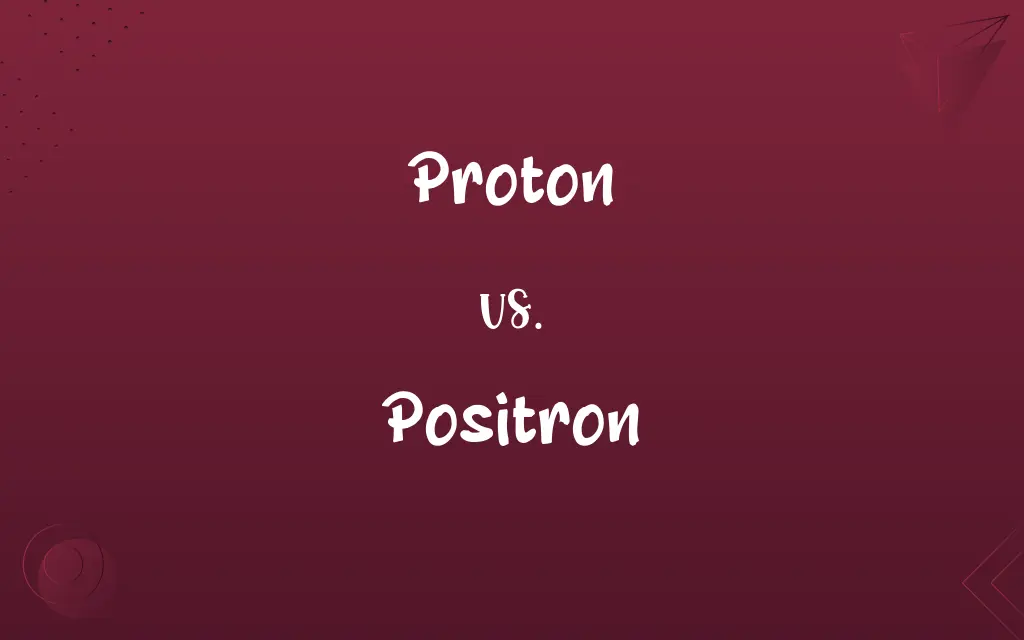Proton vs. Positron: Know the Difference

By Shumaila Saeed || Published on January 13, 2024
A proton is a positively charged subatomic particle in an atom's nucleus, whereas a positron is the antimatter counterpart of the electron, with a positive charge.

Key Differences
Protons are fundamental particles found in the nucleus of every atom, contributing to the atom's mass and defining its element. Positrons, on the other hand, are antiparticles of electrons, possessing the same mass as electrons but with a positive charge.
Shumaila Saeed
Jan 13, 2024
In terms of charge, protons carry a single positive charge, playing a crucial role in atomic structure and chemistry. Positrons, being the antimatter version of electrons, also carry a single positive charge, but they are less commonly found in nature and usually observed in high-energy physics experiments or in certain types of radioactive decay.
Shumaila Saeed
Jan 13, 2024
Regarding their discovery, protons were identified in the early 20th century as a component of the atomic nucleus, fundamentally shaping our understanding of atomic physics. Positrons were theorized by Paul Dirac and discovered in cosmic rays by Carl Anderson, providing crucial insights into the existence of antimatter.
Shumaila Saeed
Jan 13, 2024
Protons are stable particles under normal conditions and are essential for the existence of matter as we know it. Positrons, however, are highly unstable in our matter-dominated universe; when they encounter electrons, they annihilate each other, releasing energy in the form of gamma rays.
Shumaila Saeed
Jan 13, 2024
In practical applications, protons are utilized in technologies like proton therapy for cancer treatment, while positrons are used in Positron Emission Tomography (PET) scans in medical diagnostics, exploiting their unique properties for beneficial purposes.
Shumaila Saeed
Jan 13, 2024
ADVERTISEMENT
Comparison Chart
Stability
Stable under normal conditions
Unstable in the presence of electrons
Shumaila Saeed
Jan 13, 2024
Role in Atom
Determines atomic number and element identity
Does not contribute to atomic structure
Shumaila Saeed
Jan 13, 2024
Practical Use
Used in proton therapy for cancer
Used in Positron Emission Tomography (PET) scans
Shumaila Saeed
Jan 13, 2024
ADVERTISEMENT
Proton and Positron Definitions
Proton
A fundamental constituent of ordinary matter.
Protons, neutrons, and electrons make up an atom.
Shumaila Saeed
Dec 15, 2023
Positron
The antimatter counterpart of the electron.
A positron is emitted during certain nuclear reactions.
Shumaila Saeed
Dec 15, 2023
Proton
An elementary particle with a mass of approximately 1 amu.
Protons and neutrons contribute to most of an atom's mass.
Shumaila Saeed
Dec 15, 2023
Positron
A subatomic particle with a positive electric charge.
When a positron encounters an electron, annihilation occurs.
Shumaila Saeed
Dec 15, 2023
Proton
A positively charged particle in an atom's nucleus.
The number of protons in the nucleus determines the element.
Shumaila Saeed
Dec 15, 2023
ADVERTISEMENT
Positron
A particle observed in high-energy physics experiments.
Positrons are often produced in particle accelerators.
Shumaila Saeed
Dec 15, 2023
Proton
A stable subatomic particle with a charge of +1e.
Hydrogen's nucleus consists of a single proton.
Shumaila Saeed
Dec 15, 2023
Positron
Used in medical imaging, like PET scans.
Positron emission is crucial for PET scan technology.
Shumaila Saeed
Dec 15, 2023
Proton
The particle responsible for defining the chemical element.
Changing the number of protons transforms the element.
Shumaila Saeed
Dec 15, 2023
Positron
An elementary particle with the same mass as an electron.
Positrons behave similarly to electrons but have opposite charges.
Shumaila Saeed
Dec 15, 2023
Proton
The stable, positively charged nucleon, having a mass 1,836 times that of an electron and being a baryon composed of two up quarks and one down quark. The proton is a basic component of all atomic nuclei and the nucleus of the protium isotope of hydrogen.
Shumaila Saeed
Dec 13, 2023
Positron
An elementary particle having the same mass and magnitude of charge as an electron but exhibiting a positive charge; the antiparticle of the electron. Also called antielectron.
Shumaila Saeed
Dec 13, 2023
Proton
(particle) A positively charged subatomic particle forming part of the nucleus of an atom and determining the atomic number of an element, composed of two up quarks and a down quark.
Shumaila Saeed
Dec 13, 2023
Positron
(particle) The antimatter equivalent of an electron, having the same mass but a positive charge
The notion of a positron weapon remains the stuff of science fiction.
Shumaila Saeed
Dec 13, 2023
Positron
An elementary particle with positive charge; interaction of a positron and an electron results in annihilation
Shumaila Saeed
Dec 13, 2023
Proton
A stable particle with positive charge equal to the negative charge of an electron
Shumaila Saeed
Dec 13, 2023
Repeatedly Asked Queries
How are positrons created?
Through high-energy processes, like radioactive decay or in particle accelerators.
Shumaila Saeed
Jan 13, 2024
Do protons define the element?
Yes, the number of protons determines the atomic number and element.
Shumaila Saeed
Jan 13, 2024
What is a positron?
The antimatter counterpart of the electron with a positive charge.
Shumaila Saeed
Jan 13, 2024
What happens when positrons meet electrons?
They annihilate, releasing energy as gamma rays.
Shumaila Saeed
Jan 13, 2024
Are protons used in medical treatments?
Yes, in proton therapy for cancer treatment.
Shumaila Saeed
Jan 13, 2024
Can positrons exist freely in nature?
They are rarely found in nature due to their tendency to annihilate with electrons.
Shumaila Saeed
Jan 13, 2024
Are positrons used in technology?
Yes, notably in PET scans for medical imaging.
Shumaila Saeed
Jan 13, 2024
Can protons change into other particles?
Under normal conditions, protons are very stable and do not change.
Shumaila Saeed
Jan 13, 2024
Is the mass of a positron significant?
It has the same mass as an electron, which is significant in particle physics.
Shumaila Saeed
Jan 13, 2024
Do protons participate in chemical reactions?
Indirectly, as they define the element and its chemical properties.
Shumaila Saeed
Jan 13, 2024
How do protons contribute to atomic mass?
Along with neutrons, they make up most of an atom's mass.
Shumaila Saeed
Jan 13, 2024
Can the number of protons in an atom change naturally?
Not under normal conditions; changes in proton number usually involve nuclear reactions.
Shumaila Saeed
Jan 13, 2024
What is the significance of positrons in science?
Their study helps in understanding antimatter and fundamental particle physics.
Shumaila Saeed
Jan 13, 2024
How are positrons detected?
Using specialized detectors in particle physics experiments or medical imaging.
Shumaila Saeed
Jan 13, 2024
What signifies the presence of positrons?
Their annihilation with electrons, producing specific energy signatures.
Shumaila Saeed
Jan 13, 2024
Share this page
Link for your blog / website
HTML
Link to share via messenger
About Author
Written by
Shumaila SaeedShumaila Saeed, an expert content creator with 6 years of experience, specializes in distilling complex topics into easily digestible comparisons, shining a light on the nuances that both inform and educate readers with clarity and accuracy.









































































